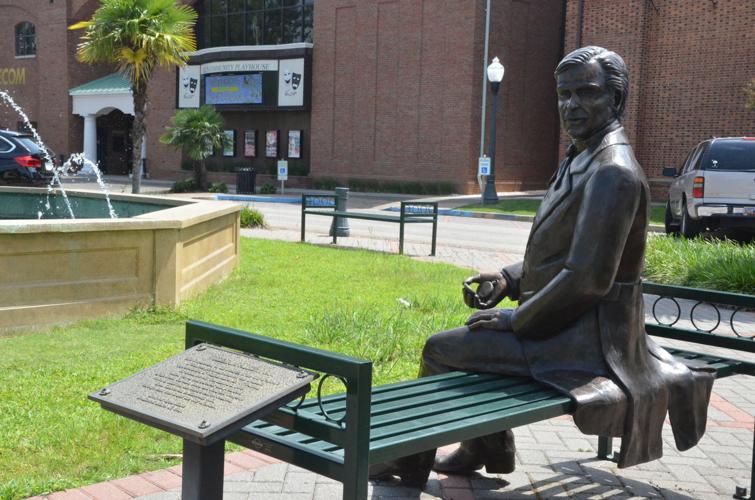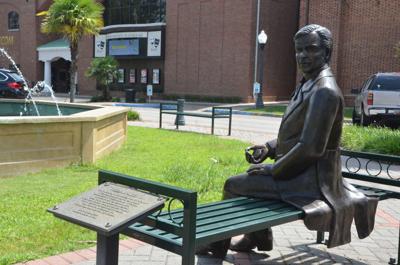Aiken: William Aiken Sr. founded and served as the first president of the South Carolina Canal and Railroad Company. The company built the Charleston to Hamburg rail line that led to the founding of Aiken. However, Aiken wouldn't live to see the town that carries his name. He died in 1831 in a carriage accident after a train whistle frightened his horse.
Aiken County: Aiken County was also named for William Aiken Sr. It was formed after the Civil War from parts of Barnwell, Edgefield, Lexington and Orangeburg counties.
Bath: Origin uncertain. The area is thought to be named after the English city.
Beech Island: Named for beech trees; There are two theories about the word "island" in the community's name. One is that the word was originally highland and was changed over time. The other is that the area resembled an island with beech trees.
Belvedere: The community's name is an Italian word meaning beautiful view which references the views of the Savannah River from the area.
Burnettown: Named for Daniel Burnette. Burnette owned the land on one side of a trolley line that ran between Langely and Bath. The trolley line stopped in 1929. A few years later, several local entrepreneurs used the former trolley bed that had been converted into road to transport mill workers. They needed a town to license their services so they incorporated the town.
Clearwater: Named for the town's mill, the Clearwater Mills.
Eureka: Origins unknown. Supposedly, a train passenger arrived in the area, then known as Seigler's Mill, and said, "Eureka, I have found it."
Gloverville: Named for Billie Glover. Glover owned the land that became the community.
Graniteville: Named for granite rock. The community's first buildings were constructed using blue granite and its former high school sports team was called the Rocks.
Hamburg: Named for Hamburg, Germany. The ghost town was the site of the 1876 Hamburg Massacre.
Jackson: Named for President Andrew Jackson. Jackson's the only president to date to be born in South Carolina.
Langley: Named for William Langley. Langley was principal stockholder of the town's mill. The town was originally named Kalmia but the name was changed to honor Langley in the 1870s.
Meriwether: Named for Dr. Nicholas Meriwether. Meriwether was also a Confederate veteran and farmer.
Monetta: Named for the daughter of an Indian chief. She is supposedly buried near the center of the town.
Montmorenci: Origins unknown. Could be named after a French village named Montmorency. Supposedly, a local landowner thought the area resembled the French village.
New Ellenton: Named for the former town of Ellenton. Ellenton was one of several settlements that moved to make way for the Savannah River Site. Legend has it that Ellenton was named by the president of the 1896-era Charleston and Western Carolina Railroad after he was struck by the beauty of the daughter of the family he was staying with.
North Augusta: Named for its location. The city lies across the Savannah River from Augusta. Georgia founder James Oglethorpe named Augusta after the mother of King George III, Princess Augusta of Saxe-Gotha-Altenburg.
Perry: Named for Gov. Benjamin Perry; President Andrew Johnson appointed Perry governor after the Civil War. Perry served from July to November 1865. He later ran for Senate and the U.S. House of Representatives but lost both elections.
Ridge Spring: Named for its location. The community lies near a ridge and a spring that provided drinking water.
Salley: Named for Dempsey Salley. Salley was a state legislator who worked to bring the railroad through the town. The town was originally called Johntown (the three founding fathers were all named John) but its name changed Dec. 13, 1887.
South Carolina: Named for King Charles I. Carolina is the feminine form of Charles. The English province of Carolina was chartered in 1663 and formally split into North and South Carolina in 1712.
Vaucluse: Origins unknown. Supposedly, the town's name is a corruption of French words — Huguenots settled in the area — meaning vale of flowers.

Warren Mill, a former textile factory, is located in Warrenville. The historic property recently was sold for $1.6 million. (Dede Biles/Staff)
Warrenville: Named for the town's mill, Warren Company Cotton Mill. The mill's founder, Charles Warren Davis, named the community.
Windsor: Origins unknown. Supposedly, the town is named after Andrew Windsor. Windsor died in 1813 and his will transferred some of the land that became the town.
Wagener: Named for George Wagener. Wagener was a Charleston wholesaler and strongly supported the railroad that ran through the town. The town was originally called Guntersville after a prominent local family. But, J.A. Gunter worked to get the town's name changed to honor Wagener.





